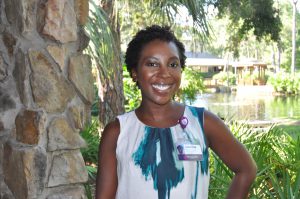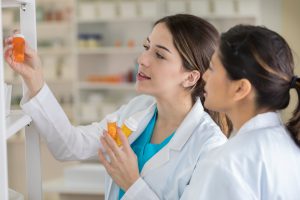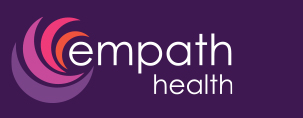
Empath Health Clinical Pharmacy Coordinator Jasmine Mills
It’s American Pharmacists Month and our Empath Health Pharmacy is proudly celebrating the work they do caring for individuals in our hospice, HIV, senior or home health care and services.
“We try to let staff know that we appreciate everything they do. We had an appreciation breakfast, an ice cream social and other events this month. And we thought it would be nice to help another part of our organization and held a drive for the EPIC (Empath Partners in Care) food and personal care pantry for HIV clients,” shared Jasmine Mills, RPh, PharmD, clinical pharmacy coordinator for Empath Health Pharmacy.
In this Q&A, Mills discusses her professional background, the pharmacy department and services, collaboration with the pharmacy and care teams, internal and community staff education and medication reviews and recommendations that help enhance comfort and quality of life for patients.
Q&A with Clinical Pharmacy Coordinator Jasmine Mills:
1. Where are you from originally?
Maryland.
2. How did you become interested in clinical pharmacy care?
From an early age I knew that I wanted to do something in health care. I had dreamed of being a pediatric surgeon until I witnessed it (that care). I had a family friend who was a pharmacist and I shadowed her at a hospital. It was excellent because she was working with the physicians and collaborating with the nurses. I really enjoyed seeing pharmacists in action.
3. Where did you go to school and work?
Florida A&M University in Tallahassee in 2004, where I was in a six-year program for pharmacy. Then I did a residency program at the James A. Haley Veterans’ Hospital in Tampa and I worked at North Florida Regional Medical Center in Gainesville.
4. How long have you worked at Empath Health?
It will be six years this November.
5. What drew you to Empath Health?
During my last year in pharmacy school I went to different sites for rotation to see how things work. I did a one-month rotation here at Suncoast Hospice. That was my first exposure to hospice. I really enjoyed it. I heard the position was open here, applied and the rest is history.
6. What makes Empath Health Pharmacy unique?
I think we’re one of the few hospice organizations that has a pharmacy. We’re not a typical retail pharmacy. A lot of pharmacies don’t have the clinical pharmacy component. I think it’s a great plus to have that higher level of expertise for the organization when needed. We have a clinical team making sure patients’ meds are appropriate and sound. It’s a caring place.
7. Who do you work with at the pharmacy?
We have a pretty large pharmacy department. My small team includes two full-time clinical pharmacists and one part-time clinical pharmacist. I really enjoy working with this group because we are all very willing to help each other or answer questions. We can put our brains together and figure out a plan based on our experiences. Two of our pharmacists have been with us for a long time. They have a wealth of knowledge about hospice in general and have seen a lot of different types of patients, so it’s great to be able to chat with them and figure out difficult cases.
My main office is at our Care Center North Pinellas but I do come into the pharmacy office quite a bit. It’s a good environment to work in because everyone is very friendly and cordial. We make sure patients’ needs are put first. We get things clarified, get meds out the door and work on challenging cases.
 8. What services does the pharmacy provide?
8. What services does the pharmacy provide?
My team of clinical pharmacists and I attend the care teams’ meetings and review patients’ profiles. We look for any pharmacy-related issues, such as interactions with meds, inappropriate dosing, high-risk meds or meds that may cause harm to patients. We provide recommendations to the team physicians or community physicians. We go to the Care Centers at least once a week and attend their team meetings or go on rounds with the physicians. We learn about any concerns and I provide my recommendations directly to the nurses.
We do pain and symptom management consults, especially dosing conversions and Methadone conversions, and everything that can be done through our pharmacy. We can get very creative, such as being able to provide suppository or IV antibiotics. Sometimes we’ll do home visits or care plan meetings for patients who are in facilities, if there are any issues or concerns or if their pain is not under control.
Another thing we do is take pharmacy students from schools in the area, such as USF (University of South Florida), UF (University of Florida) and Florida A&M University. We provide some of the experiences that I went through as a student and give them exposure to pharmacy practice as well as hospice.
9. What are some of your job responsibilities?
I wear a bunch of hats like we all do. It’s fun. I’m very involved in the care teams’ meetings. I enjoy going to the meetings and building rapport with people. I also work very closely with the physicians group and attend their medical staff meetings once a month. It’s great to hear their concerns, share any pharmacy concerns and make plans.
I teach a pain class once a month to all new employees who are going through orientation and another clinical pharmacist teaches the prescriptions ordering process class. Occasionally a professional relations liaison will ask if I can do an education presentation with CEs (continuing education credits) for staff at nursing homes. I teach pain management education and will soon teach COPD (chronic obstructive pulmonary disease) and heart failure education at nursing homes. It’s a cool opportunity to offer this education to our care partners and spread the word about our organization and its services.
When Joint Commission was here I helped write some of the policies and procedures for the medication management section and worked with the EMR (electronic medical record) selection process.
10. What is new at the pharmacy?
We started giving flu shots for staff last year. This year we will run our flu clinics through December with more dates and offerings.
I’m training and working with our new clinical pharmacist at Suncoast PACE (Program of All-Inclusive Care for the Elderly). She’s really great. We’re doing some similar services there with a little more interaction with the PACE participants. We review participants’ medications at home or when they come into the PACE clinic. We collaborate with their providers and educate them on the medications for the participants.
11. How does the pharmacy help improve life for those in care?
Some of my students ask, “Isn’t it hard to work for hospice?” It’s hard, but I know that I make a difference in patients’ lives. We may decrease their pill burden, provide a pain and symptom consult to help them feel more comfortable or look at things that could cause them harm.
What I find to be the most helpful, valuable and enjoyable about this position is knowing that some of my interventions or recommendations are going to help improve patients’ quality of life. I may not see patients at their bedsides every day but I know I’m benefiting them in whatever time they have left. It’s good to hear that patients are feeling better.
Do you have a story to share about our care?
Please submit your story here. It’s our honor to serve you!

Great job Jasmine. We know how much our patients and families benefit from the comprehensive review of medications and treatment plans that our clinical pharmacists offer. Always appreciative of you, Susan Phipps, Alba Spicer and Christina Assad.